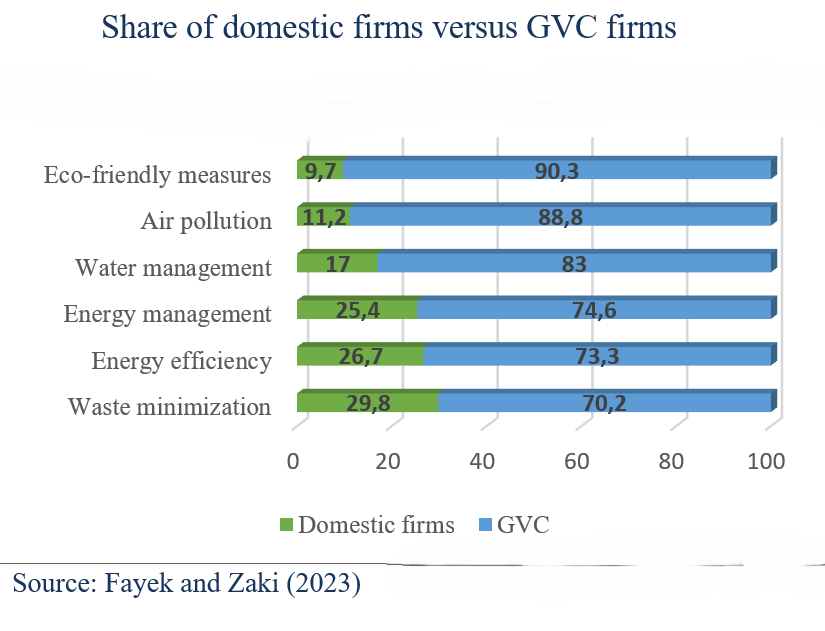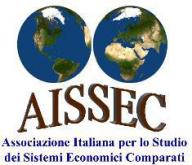By Chahir Zaki[1]
Introduction
Environmental concerns are becoming more and more important in today's globalized world. This topic becomes even more relevant with the increasing participation of developing countries into global value chains (GVC) that represent almost 70% of the current trade flows. Since environmental conservation is essential to halting climate change, it is crucial to understand the bidirectional relationship between Global Value Chains (GVCs) and climate change on the one hand; and GVC and the environment on the other, which makes the analysis rather complicated.
How GVC affect climate change and the environment?
GVC has an effect on carbon emissions and the environment via several channels. First, the technique and competition effects refer to the case where green technologies and eco-friendly products benefit the environment and enhance its quality (but not in early-stage participation in GVC) (Wang et al., 2019). Second, GVC can affect the environment through international transport related to trade that is linked to increases in carbon emissions (OECD, 2017). Transport pollution is higher in GVC compared to standard trade since product crosses borders many times. Finally, according to the Pollution Heaven Hypothesis, multinational firms operate in countries with lenient environmental laws in order to avoid costly environmental requirements, making these countries pollution heavens (Ben David et al., 2020). Bazillier et al. (2024) show that forward GVC participation increases carbon emissions and has an environmental downgrading effect. However, this effect is attenuated by the number of laws related to the environment and to the existence of environmental provisions that are legally enforceable.
To what extent is GVC affected by climate change and the environment?
Developing countries face a double risk that could affect their participation in GVCs: on the one hand, these countries may face a “physical risk” associated with natural disasters and resulting in output losses, reduced FDI, and reduced participation in GVCs. On the other hand, these counties face a “transition risk” related to the necessary adjustments in regulations, production techniques, and energy deployment (Beirne et al., 2021). Aboushady and Zaki (2024) distinguish between these two risks and find that physical risk from climate change (measured by natural disasters and death from natural disasters) is negatively, yet weakly associated with participation in GVCs. On the other hand, CO2 emissions (per-capita and from manufacturing) have a negative impact on GVC participation, while increasingly shifting to renewables increases GVC participation. In the same vein, Fayek and Zaki (2023) examine the impact of environmentally oriented investments on the firms’ integration into GVCs. The evaluation of the firm’s environmental performance is based on its engagement in different environmental actions, namely adopting an eco-friendly energy generation, energy management measures, any measures that enhance energy efficiency, air pollution control measures, water management measures or waste minimization, recycling, and waste management measures. Using firm-level data in 41 countries from the Business Environment and Enterprise Performance Survey (BEEPS), they show that firms could raise their opportunity to participate in GVCs by adopting environment protection actions through the mediation of productivity gains, yet the impact of adopting such actions on the intensity of GVC participation tends to be negligible.

This figure shows that the share of GVC firms, among those who adopt environmental actions, is higher than the corresponding share of domestic firms. Hence, GVC firms tend to have a higher environmental performance. Nevertheless, the authors do not show noticeable evidence of a positive association between environmental upgrading and the intensity of participation in GVCs. Therefore, environmental performance may be affecting the probability of integration in GVCs rather than the intensity of GVC participation, which confirms the fact that such measures should be perceived as a fixed cost for GVC firms. Similarly, larger firms are more likely to experience a raise of their chance to participate in international trade through environmental upgrading rather than their smaller counterparts. Another strand of the literature analyses the impact of GVC participation on environmental performance (Agostino et al, 2023 and Siewers et al, 2024) and shows that firms that are part of GVC are more likely to implement environmental measures.
The way forward
From a policy perspective, major and significant environmental challenges that threaten sustainable development have forced the elaboration of multiple national and international environmental policies and regulations, though few significant positive outcomes have been achieved in terms of sustainable development. This is why making trade agreements more environmentally friendly by including legally enforceable provisions that are complemented by effective national laws will make both trade and GVC flows cleaner. In addition, to help firms abide by these regulations, governments need to provide incentives for firms, given that the adoption of clean technologies is usually associated with significant costs and requires the reshaping of the production organization. This can take place through adequate public investments, notably in green infrastructure that raises the firms’ private benefits and through technical and financial support to firms investing in sustainable practices, especially small firms to help them abide by more stringent environmental regulations.
References
- Aboushady, N. and Zaki, C. (2024) “Disentangling the impact of climate change on GVC participation: implications of physical and transition risks for developing countries”, paper presented at the European Trade Study Group conference.
- Agostino, M., Giunta, A., Ruberto, S., & Scalera, D. (2023). Global value chains and energy-related sustainable practices. Evidence from Enterprise Survey data. Energy Economics, 127, 107068.
- Bazillier, R., Hosny, M., and Zaki, C. (2024) “Global Value Chains Participation and Environmental Upgrading: Evidence from Developing Countries” (mimeo)
- Fayek, M. and Zaki, C. (2023) “Does "Going Green" Promote Global Value Chains Integration?” LEO Working Paper Series, DR 2023-21.
- Siewers, S., Martínez-Zarzoso, I., & Baghdadi, L. (2024). Global value chains and firms’ environmental performance. World Development, 173, 106395.
[1] Chaired Professor of Economics, University of Orléans, and Research Fellow at the Laboratoire d’Economie d’Orléans and Economic Research Forum,









